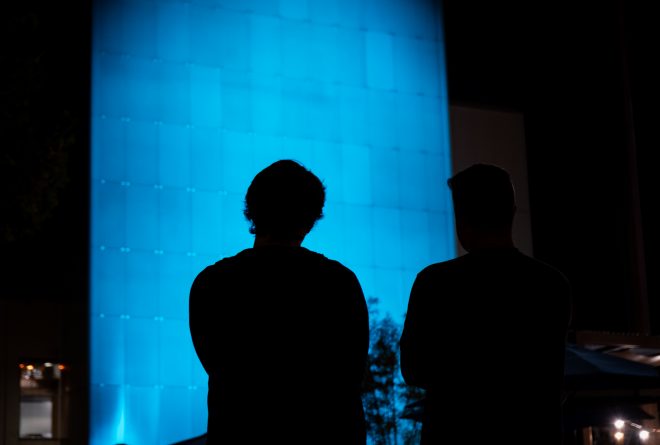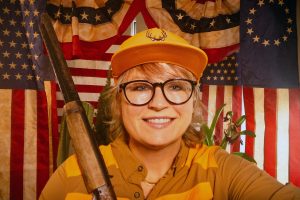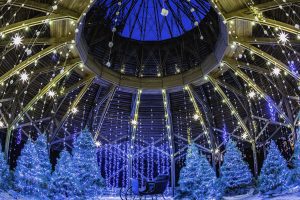Amos Cochran: The Art of Artificial Intelligence

Composer and video artist Amos Cochran’s recent multimedia installation at the Momentary in Bentonville rebelled against the onslaught of Artificial Intelligence (AI). Projected onto a six-story building, the outdoor exhibit titled N.I. (Natural Intelligence) ran from September 8 to November 12, 2023. Cochran’s portentous musical score and rave-like light show reflected AI’s unsettling effects on the world.
Well known in Arkansas for years of concerts and collaborations, Cochran recently achieved a run of successes. Natural Intelligence played during the summer and fall at the Assembly festival in Springdale, at the Format festival in Bentonville, and then in a month-long residency at the Momentary. He wrote music for an exhibit called Sound & Color at the Crystal Bridges Museum of American Art. And a children’s TV series he scored, The Mystery League, debuted in November on PBS.
We live in a constant state of interruption by technology and AI, punctuated by pop-up ads and “doom scrolling,” said the artist in a statement for the Natural Intelligence show.
The term natural intelligence, is the opposite of AI. It’s a little-used phrase that means something like intuition. Natural intelligence is how a wilderness tracker uses senses and experience to find food and navigate home.
Artificial intelligence can already automatically generate multimedia extravaganzas like Cochran’s with little human input. However, the artist’s point is that he deliberately produced this show using his natural intelligence – handcrafting it with traditional tools (by today’s standards).
Cochran created the audio using Metaphysical Functions by Reaktor, which is sound-generation software dating back to 1996. He edited it with Logic Pro. He produced most of the video with a trial version of Davinci Resolve. “Is it possible that time and attention allow for something wholly digital to feel more meaningful and nuanced?” he said of the laborious process.
Cochran’s timely exhibit coincides with the spread of consumer AI apps like Chatbot GP. AI was first recognized at a Dartmouth College conference in 1956, about 10 years after the advent of electronic computing. AI was the offspring of that era’s primitive if-then programming, and it’s been mutating like a virus ever since.
Shortly after the sun sets, the Natural Intelligence show begins. Blips and blobs of colored light creep across the screen, projected from the roof of a nearby building. The music is orchestral, dissonant. Rapid transitions of shape and color twist the stomach like a Tron movie or test patterns on an antique black-and-white television. Fast-moving center lines on a highway dissolve to crackling blasts of energy.
It’s like looking out the spaceship window after getting a full-body scan. Like waking from cryo sleep.
Cacophonous sounds with flickering violins swell to stirring crescendos near the finale when a single flare of white light flies northward.
The soundtrack of Natural Intelligence features violinist Er-Gene Kahng and guitarist Kevin Blagg. Cochran said his inspirations for the show include Alva Noto, a pioneer of abstract music video, and Ryoji Ikeada, the Japanese composer and digital artist.
Amos Cochran’s music career began as a teen bass-guitar player in his hometown of Fayetteville. Today, at age 39, he’s an established artist in multiple disciplines. As a composer, he’s credited with four film scores on IMDB. He’s written and performed a dozen music albums of piano-synth chamber pop and moody soundtracks, available on streaming services and free on Bandcamp or his website. He’s won awards for audiovisual projects and been in film festivals like Sundance and Toronto.
A smaller version of Natural Intelligence debuted in a black box theater at the Assembly festival in Springdale this summer. Cynthia Post Hunt, the Momentary’s curator of performance, brought it to Bentonville, where it was shown free on many evenings.
Natural Intelligence was well received by an audience of about 75 at the Momentary on a chilly November evening near the end of its run. It’s an exciting visual experience with intense music. Maybe the show doesn’t address the perilous, fast-growing chasm between AI and NI in a specific way. But Cochran succeeded at reflecting society’s uneasiness about AI. The show is timely, skillfully produced, and stupendous at 100 feet tall.
The fact that the handcrafting of a multimedia show is nearly obsolete – even a bit subversive – says something about what the future may bring. AI is good at many things, and the situation is getting worse. AI made another of its evolutionary leaps when it was used to rip the new Beatles song “Now and Then.” Look for the term natural intelligence to come more into daily usage as AI becomes dominant.
AI is no longer only about virtual assistants, robo customer service or self-driving cars. It’s becoming stronger at writing prose, drawing pictures and composing music. That’s something all artists and knowledge workers should be concerned about – if they want to keep their jobs.
This article appeared originally in the New Haven Independent.
Photo by Carson Ford





Comments